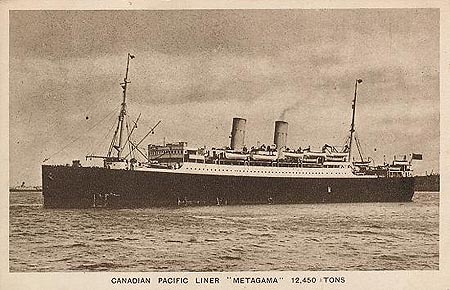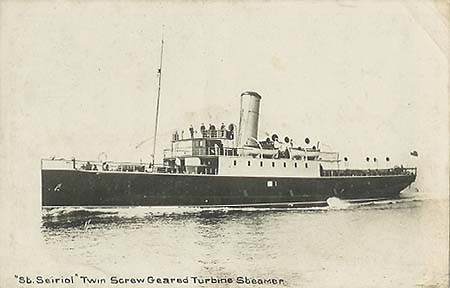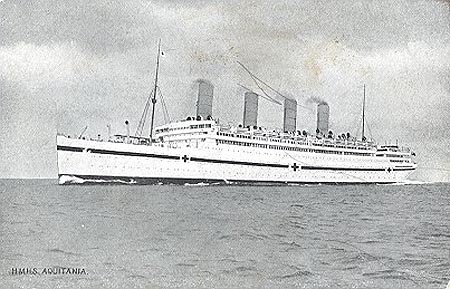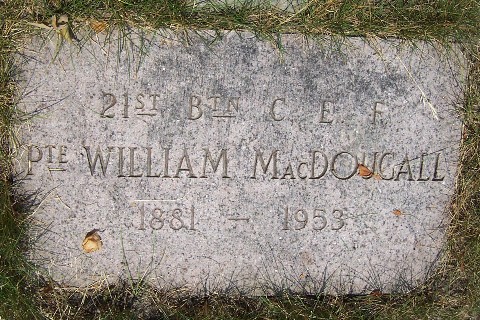|
Mar 17, 1882
|
Born in Saltcoats, Ayrshire,
Scotland
|
|
Jan 22, 1915
|
Attested into the 21st
Battalion CEF in Kingston, Ontario
Ø Number 59710
(temporary number 1222)
Ø Next of kin given
as Mrs. Nettie McDougall, wife, 1316 Jerome St., Philadelphia, Pennsylvania,
USA
o The address was
later changed to read 312 Barton St. W., Hamilton, Ontario
Ø Previous occupation
given as Steam Engineer
Ø Previous military
experience given as Cameron Highlanders for 8 years
Ø Religion given as
Presbyterian
Ø Assigned to the
Depot Company
o Employed as a Piper
in the Pipe Band
The battalion trained in the
Kingston area through the winter with headquarters in the Kingston Armouries
|
|
Feb 3, 1915
|
Appointed to the rank of
Acting Corporal in the Pipe Band
|
|
May 6, 1915
|
Embarked the RMS Metagama in Montreal,
Quebec

|
|
May 15, 1915
|
Disembarked in Devonport,
England and the battalion proceeded to the West Sandling Camp, near Hythe,
Kent to continue training
|
|
Jun 13, 1915
|
Forfeited 1 days pay for being
absent
|
|
Sep 14, 1915
|
Embarked the St. Seiriol in
Folkestone

|
|
Sep 15, 1915
|
Disembarked in Boulogne,
France and the battalion proceeded to St. Omer
|
|
Oct 5, 1915
|
Sentenced to 10 days Field
Punishment #2 for being drunk on parade
|
|
Dec 5, 1915
|
Sentenced to 28 days Field
Punishment #2 for being absent from November 26 to November 30 and forfeited
4 days pay
|
|
Jul 24, 1916
|
Admitted to the No. 6 CFA (Canadian
Field Ambulance) to receive first aid for a shrapnel wound to his right
thigh. He was transferred the same day
to the No. 17 CCS (Casualty Clearing Station) for treatment.
Later that night he was transferred via the
No. 18 AT (Ambulance Train) and admitted to the No. 3 Canadian General
Hospital in Boulogne
|
|
Jul 27, 1916
|
Transferred to the No. 1
Convalescent Depot in Boulogne to continue the recovery of his wounds
While here William McDougall
revealed that he had been buried by a shell explosion when the parapet caved
in on him a few months earlier. He did
not seek any treatment at the time, but since has had hearing problems and
feeling nervous
|
|
Jul 28, 1916
|
Discharged to base details for
light duties
|
|
Jul 31, 1916
|
His medical classification was
set at TB (Temporary Base) meaning he was temporarily not fit for front line
duty. He was then discharged to the
CBD (Canadian Base Depot) in the Rouelles Camp, Havre and posted to “A”
Company for those recovering from wounds and illness
|
|
Aug 8, 1916
|
Forfeited all pay and
allowances for 21 days and required to pay for damages to government
property, drunkenness and assaulting a Military Police officer
|
|
Aug 24, 1916
|
His medical classification
changed to “C” meaning he was only fit for service in England
Invalided to England and
posted to the CCAC (Canadian Casualty Assembly Centre)
|
|
Aug 31, 1916
|
Admitted to the Military
Convalescent Hospital in Wood Cote Park, Epsom
|
|
Dec 10, 1916
|
Medical Board in Epsom notes
that his leg wound has healed but he suffers from Neurasthenia. He is nervous and weak.
|
|
Dec 18, 1916
|
Discharged from hospital and
reported to the CCAC in Hastings for duty
|
|
Dec 20, 1916
|
Attached to the CGDD (Canadian
Garrison Duty Depot) for duty
|
|
Mar 10, 1917
|
Transferred to the EORD (Eastern
Ontario Regimental Depot)
|
|
Apr 13, 1917
|
Attached to the convalescent
depot in Seaford
|
|
Jan 24, 1918
|
Transferred back to the EORD
|
|
Jan 25, 1918
|
Reported to the EORD Depot
Company at Seaford
|
|
Feb 18, 1918
|
Admitted to the Harfield
Military Hospital in Bristol with a diagnosis that reads VDS (Venereal
Disease Syphilis)
|
|
Mar 1, 1918
|
Discharged from hospital to be
treated as an out-patient
|
|
Mar 2, 1918
|
Attached to the 6th
Reserve Battalion in Seaford for duty
|
|
Mar 28, 1918
|
Ceased to be attached to the 6th
Reserve Battalion and attached to the CDD (Canadian Discharge Depot) in
Buxton pending return to Canada
|
|
Apr 24, 1918
|
Invalided to Canada aboard the
SS Aquitania, embarking in Liverpool

|
|
Apr 30, 1918
|
Disembarked in Halifax, Nova
Scotia and proceeded to Toronto, Ontario
On arrival in Toronto he was TOS
No. 2 District Depot and placed in the Ravina Barracks
|
|
May 20, 1918
|
Attended the Ear, Nose and
Throat clinic in the Toronto General Hospital. Their report indicates that he is deaf in
his left ear as a result of a shell explosion in France
|
|
May 22, 1918
|
A neurological report notes
the following
Ø Concentration poor
Ø Easily excited and
startled by unexpected noise
Ø When excited he
sweats freely
Ø Only able to sleep
4-5 hours per night and is bothered by nightmares
Ø Feels weak and
becomes short of breath on slight exercise
Ø Has tremors in
hands
Ø Suffers from
headaches and back pain
The doctor’s note at the end
states that he should do well if discharged.
|
|
Jun 7, 1918
|
Discharged from the CEF in
Toronto, Ontario
Ø Rank on discharge
Private
Ø War Service Badge
Class “A” issued
Ø Proposed residence
on discharge 312 Barton St. W., Hamilton, Ontario
Following his discharge the
1914-15 Star, British War Medal and Victory Medals were sent to him at 312 Barton
St. W., Hamilton
|
|
Jul 10, 1953
|
William McDougall died on this
date and was buried in the Pine Hills Cemetery, Scarborough, Ontario

Note
the spelling of his surname
|

